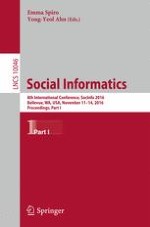2016 | OriginalPaper | Chapter
Inferring Population Preferences via Mixtures of Spatial Voting Models
Authors : Alison Nahm, Alex Pentland, Peter Krafft
Published in: Social Informatics
Publisher: Springer International Publishing
Activate our intelligent search to find suitable subject content or patents.
Select sections of text to find matching patents with Artificial Intelligence. powered by
Select sections of text to find additional relevant content using AI-assisted search. powered by
